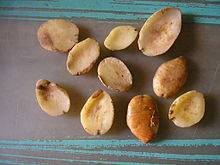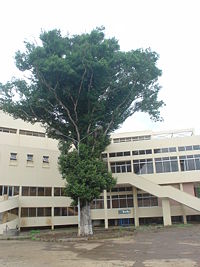Irvingia
| Irvingia | |
|---|---|

| |
| Ogbono nuts | |
| Scientific classification | |
| Kingdom: | Plantae |
| Clade: | Tracheophytes |
| Clade: | Angiosperms |
| Clade: | Eudicots |
| Clade: | Rosids |
| Order: | Malpighiales |
| Family: | Irvingiaceae |
| Genus: | Irvingia Hook.f. 1860 not F. Muell. 1865 (syn of Polyscias in Araliaceae)[1] |
| Type species | |
| Irvingia smithii | |
| Synonyms[4] | |
|
Irvingella Tiegh. | |

Irvingia is a genus of African and Southeast Asian trees in the family Irvingiaceae, sometimes known by the common names wild mango, African mango, bush mango, dika, mbukpap uyo or ogbono. They bear edible mango-like fruits, and are especially valued for their fat- and protein-rich nuts.
The fruit is a large drupe, with fibrous flesh. The subtly aromatic nuts are typically dried in the sun for preservation, and are sold whole or in powder form. They may be ground to a paste known variously as dika bread or Gabon chocolate. Their high content of mucilage enables them to be used as thickening agents for dishes such as ogbono soup. The nuts may also be pressed for vegetable oil.
The trees yield a hard wood, useful in construction.
Irvingia was described as a genus in 1860.[5][3] It is native to Africa and Southeast Asia.[4] The genus is named in honour of Edward George Irving, a Royal Navy surgeon.[6]
Species[edit]
List of species:[4]
| Image | Scientific name | Distribution |
|---|---|---|
| Irvingia excelsa | C Africa | |
 |
Irvingia gabonensis | W + C Africa |
| Irvingia grandifolia | C Africa | |
 |
Irvingia malayana | SE Asia |
| Irvingia robur | W + C Africa | |
 |
Irvingia smithii | W + C Africa |
| Irvingia tenuinucleata | W + C Africa |
References[edit]
- ^ "Tropicos". www.tropicos.org.
- ^ lectotype designated by Bullock, Kew Bull. 14: 43 (18 May 1960).
- ^ a b "Tropicos". www.tropicos.org.
- ^ a b c "World Checklist of Selected Plant Families: Royal Botanic Gardens, Kew". wcsp.science.kew.org.
- ^ Hooker, Joseph Dalton. 1860. Transactions of the Linnean Society of London 23: 167 descriptions in Latin, commentary in English
- ^ D. Gledhill. The Names of Plants. Cambridge University Press, 2008.
